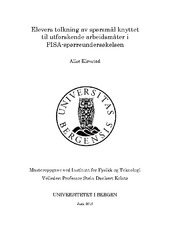| dc.contributor.author | Kløvstad, Alise | |
| dc.date.accessioned | 2019-06-20T00:31:58Z | |
| dc.date.available | 2019-06-20T00:31:58Z | |
| dc.date.issued | 2019-06-20 | |
| dc.date.submitted | 2019-06-19T22:00:16Z | |
| dc.identifier.uri | https://hdl.handle.net/1956/20257 | |
| dc.description.abstract | Formålet med denne masteroppgaven er å undersøke hvordan norske elever tolker spørsmål i PISA-spørreundersøkelsen knyttet til konstruktet utforskende arbeidsmåter. Det ble gjennomført fire gruppeintervju med totalt 15 elever på 10. trinn fra skoler på Vestlandet og Østlandet i Norge. I intervjuene ble det undersøkt hvordan ordbruken i spørsmålene påvirket elevenes tolkinger og hvilke undervisningsaktiviteter de assosierte med spørsmålene. Elevsvar tilknyttet undervisningsaktiviteter ble analysert i lys av kjennetegn på tradisjonell undervisning og en utviklet modell av utforskende arbeidsmåter som blir presentert i teorikapittelet i denne oppgaven. Funnene viser at elever hadde både like og forskjellige måter å forstå ordbruken i spørsmålene, samtidig som viktige ord var vanskelig å forstå for noen elever. Det var også stor variasjon i undervisningsaktiviteter som elevene knyttet til spørsmålene. Det viser seg at elevene tolker spørsmålene i lys av undervisningsaktiviteter som i større grad kan beskrives som en del av tradisjonell undervisning i stedet for utforskende arbeidsmåter. Funnene antyder at spørsmålene i PISA-spørreundersøkelsen ikke har klart å fange kritiske punkter som gjør utforskende arbeidsmåter særegent. På bakgrunn av dette blir det i diskusjonen påpekt muligheter for å oppnå valid og relevant informasjon fra elever om deres erfaring med utforskende arbeidsmåter i klasserommet. | en_US |
| dc.description.abstract | The purpose of this master thesis is to investigate how Norwegian students interpret questions in the PISA questionnaire related to the inquiry construct. There were conducted four group interviews with in total 15 students aged 15-16. The students were from schools located in the western and eastern parts of Norway. The students were asked how they interpreted the wording of the questions, and what sort of teaching activities they associated with the questions. Responses associated with teaching activities were analyzed in light of the characteristics of traditional teaching methods and a developed model of inquiry-based teaching presented in this thesis. Findings show that the students had both equal and different ways of understanding the wording of the questions, and important words were difficult to understand for some students. The students associated a great variation of teaching activities to the different questions. It turns out that the students interpret the questions more frequently in light of teaching activities associated with traditional teaching methods instead of inquiry-based teaching. The findings suggest that the questions in the PISA questionnaire have failed to capture critical aspects of inquiry-based teaching. Based on this, the discussion points out possibilities for obtaining valid and relevant information from students describing their experience with inquiry in the classroom. | en_US |
| dc.language.iso | nob | |
| dc.publisher | The University of Bergen | en_US |
| dc.subject | utforskende arbeidsmåter PISA | |
| dc.subject | utforskende arbeidsmåter | |
| dc.subject | intervjustudie | |
| dc.subject | PISA | |
| dc.title | Elevers tolkning av spørsmål knyttet til utforskende arbeidsmåter i PISA-spørreundersøkelsen | |
| dc.title.alternative | Norwegian students' interpretation of questions associated with the inquiry construct in the PISA questionnaire | |
| dc.type | Master thesis | |
| dc.date.updated | 2019-06-19T22:00:16Z | |
| dc.rights.holder | Copyright the Author. All rights reserved | en_US |
| dc.description.degree | Masteroppgave i fysikk | en_US |
| dc.description.localcode | PHYS399K | |
| dc.description.localcode | MAMN-PHYS | |
| dc.subject.nus | 752113 | |
| fs.subjectcode | PHYS399K | |
| fs.unitcode | 12-24-0 | |
